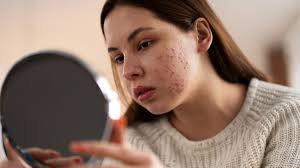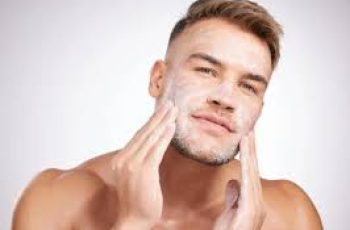
Ask the Dermatologist: 4 Lies You’ve Been Told About Acne
If you’re struggling with acne, you’re not alone.
Millions scour the internet searching for quick fixes and miracle cures to get clear skin. Unfortunately, many tips are more myth than fact—like slathering toothpaste on pimples or spraying saltwater on your face.
With so many products and advice out there, it can be confusing to separate the real help from the hype.
To clear up the confusion, we talked to Dr. Anthony Nuara, MD PhD FAAD, a board-certified dermatologist.
He helped us debunk common acne myths and pointed out which treatments really work to reduce and prevent breakouts.
What Causes Acne?
Before diving into myths, it’s important to understand what acne is and why it happens. Acne doesn’t stem from just one cause—it’s a complex condition with multiple factors.
At its core, an acne blemish happens when a pore becomes clogged with sebum (oil) and dead skin cells. This blockage can look like a blackhead or whitehead.
When bacteria like Cutibacterium acnes infect or inflame the clogged pore, it turns into a raised, red pimple.
But what triggers this excess oil and clogging? Here’s what research shows:
Genetics: Acne often runs in families. A 2021 study identified 60 genes linked to acne risk. If your parents or siblings had acne, you’re more likely to get it too.
Hormones: This is why acne is so common in teenagers. Hormonal changes during puberty boost sebum production. But hormones also fluctuate in adulthood. Women can get acne during menstrual cycles or menopause.
Men with high testosterone or on hormone therapy might also break out.
Medications: Some drugs like corticosteroids, lithium, vitamin B12, thyroid hormones, and certain antibiotics can cause acne as a side effect.
Lifestyle Factors: Stress, poor diet, and lack of sleep don’t directly cause acne, but they can worsen breakouts if you’re already prone.
4 Acne Myths You Need to Stop Believing
Now that you understand the basics, let’s bust some common acne myths that might be doing more harm than good.
Myth #1: Drinking Lots of Water Will Clear Your Acne
We all know water is essential for health and skin hydration. Drinking enough water can improve skin elasticity, helping it look more youthful.
However, no strong scientific evidence shows that drinking extra water actually clears acne.
Water helps flush toxins and keeps your skin hydrated but isn’t a magic cure for pimples. Good skincare and appropriate treatments are needed to target acne directly.
Myth #2: Only Teenagers Get Acne
Acne isn’t just a teenage problem. Many adults suffer from acne well into their 30s, 40s, and beyond.
Adult acne is especially common among women due to hormonal shifts during menstrual cycles, pregnancy, and menopause.
Men can also experience acne from hormone imbalances or hormone therapies. So if you’re an adult struggling with acne, know that it’s normal, and there are effective treatments available.
Myth #3: Junk Food Causes Acne
The link between diet and acne is complex. Eating lots of sugary, high-carb, and processed foods can worsen acne by increasing inflammation and oil production.
Research shows high glycemic index foods (think white bread, sweets) can trigger breakouts. Whey protein supplements may also aggravate acne in young adults.
But eating “clean” alone won’t cure acne if you have other underlying causes. Balanced nutrition helps overall skin health but is only one piece of the puzzle.
Myth #4: You Should Wash Your Face as Much as Possible to Get Rid of Acne
Good hygiene is important, but over-washing your face can backfire. Excessive scrubbing or harsh cleansers strip your skin’s natural oils and irritate sensitive skin, often making acne worse.
Gentle cleansing twice a day with a mild product is best. If you use cleansers with alpha or beta hydroxy acids, apply them sparingly to avoid irritation.
Overdoing it won’t speed up acne clearing and may damage your skin barrier.
Effective Acne Treatments to Consider
Navigating acne treatments can be tricky. But some ingredients have strong evidence backing their benefits. Two favorites recommended by Dr. Nuara are niacinamide and azelaic acid.
They’re gentle yet effective and can be used together safely.
Niacinamide (Vitamin B3)
Niacinamide is a multitasking skincare superstar. It reduces sebum production, which helps prevent clogged pores and future breakouts.
It also calms inflammation and redness, soothing irritated skin during acne flare-ups.
Additionally, niacinamide boosts your skin’s defense against infections and helps fade post-acne scars. It even aids in repairing damaged DNA, promoting healthier skin overall.
Look for products with around 10% niacinamide concentration, ideally combined with hydrating ingredients like hyaluronic acid.
Azelaic Acid
Azelaic acid is a naturally occurring compound found in yeast. At medical-grade 14% concentration, it’s a powerful tool against acne and rosacea.
It kills acne-causing bacteria, reduces inflammation, and unclogs pores.
Azelaic acid also helps fade dark spots and hyperpigmentation from old acne scars, giving your skin a more even tone.
It’s especially effective for hormonal acne, as it can block the excess oil production triggered by hormones like testosterone.
When to See a Dermatologist
If your acne causes deep scarring, is persistent, or painful, it’s best to consult a board-certified dermatologist. They can tailor a treatment plan specific to your skin type and acne causes.
Dermatologists can prescribe stronger medications if needed, like topical retinoids, antibiotics, or hormonal therapies.
They can also offer professional treatments such as chemical peels or laser therapy to improve stubborn acne and scars.
Final Thoughts
The world of acne treatments is full of myths, marketing hype, and confusion. But understanding the true causes of acne helps you make better choices for your skin.
Remember, no quick fix or miracle cure exists. Instead, a consistent skincare routine with proven ingredients like niacinamide and azelaic acid, combined with guidance from a dermatologist, is your best bet.
Next time you hear a bizarre acne tip or “miracle” remedy, ask for scientific evidence before trying it yourself. Your skin will thank you!
If you want clear, healthy skin, focus on good skincare habits, balanced nutrition, and the right treatments—not myths or fads.
Acne is manageable, and with the right approach, you can achieve the clearer skin you deserve.


